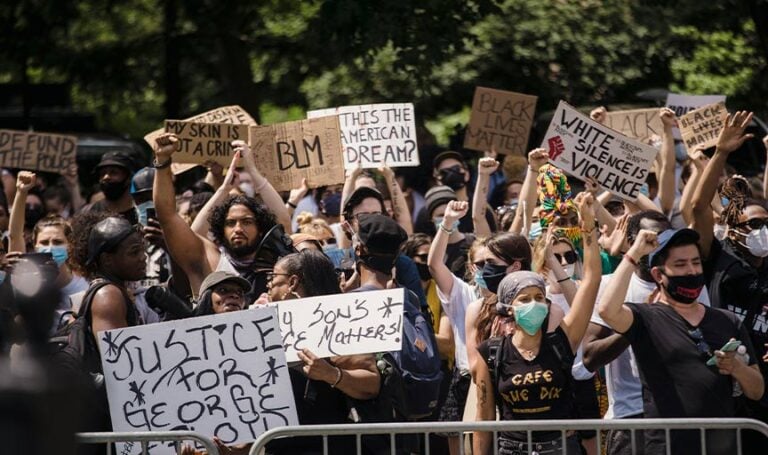What does the US Supreme Court’s decision to abolish mass protests in three states mean for democracy?
On Monday 15 April 2024, the US Supreme Court ruled to nullify the right to engage in mass protests across three states, Louisiana, Mississippi, and Texas. This non-action has ratified a lower court’s decision, which appears to essentially infringe upon the protections guaranteed by the First Amendment of the Constitution—a move that has sparked a global backlash.
In adjoining news, the Supreme Court also allowed a lawsuit to go forward against a prominent Black Lives Matter activist, DeRay Mckesson, who led a protest in Louisiana in which a police officer was injured. These compounded decisions mean that protest organisers in these states could face severe financial penalties if any attendee engages in unlawful behaviour during a protest.
The case, McKesson v. Doe, was brought forward by a police officer, John Doe, against McKesson. The officer claimed that Mckesson should be liable for personal injuries he suffered after an unknown individual—not Mckesson—threw a “rock-like” object at the officer during a 2016 protest of the killing of Alton Sterling by Baton Rouge, Louisiana police.
The officer does not maintain that McKesson encouraged or even knew about the rock-throwing. Rather, he is suing McKesson for negligence, with the claim that he was aware the demonstration would incite violence and failed to pacify the crowd.
McKesson, a leading voice in the Black Lives Matter movement, gained prominence for his civil rights advocacy starting in 2014. Recognisable by his distinctive blue vest, he played a pivotal role in raising awareness of systemic racial injustices. However, despite only being an organiser of the event, he’s currently facing legal repercussions.
The Supreme Court's decision to reject an appeal brought by Black Lives Matter activist DeRay Mckesson is wholly incongruent with the First Amendment, tort law, and doctrine from the civil rights movement concerning freedom to protest. https://t.co/IxWc2Lzn6l
— Legal Defense Fund (@NAACP_LDF) April 16, 2024
The Supreme Court’s decision not to hear the case has significant implications, particularly in traditionally conservative states like Louisiana, Mississippi, and Texas. Critics argue that the ruling disproportionately impacts activists of colour and suppresses their ability to advocate for social change. Under this new bill, organisers like Mckesson risk severe financial consequences for any unlawful actions committed by protest attendees.
@somebodyfineazmama Right to protest abolished in #texas #mississippi #louisiana
♬ original sound - somebodyfineazmama
@aliyehtheg #stitch with @grapesyrop #blm #freepalestine
♬ original sound - Aliyeh The Iranian
So, let me break it down for you. The concept essentially implies that the highest court is ruling on holding a protest organiser accountable for the actions of a stranger present at the protest. This is not because the organiser directly incited or intended those actions, but simply because it was foreseeable that they might occur.
You see, it’s no secret that this court leans conservative. It’s like taking a step back from the core values of free speech and assembly that we’ve long championed. By letting the lower court’s ruling slide without a second look, the Supreme Court is essentially leaving organisers like Mckesson out in the legal cold. This decision doesn’t just put them at risk; it also puts a damper on our ability to voice our opinions and push for change.
Interestingly, beyond the US, the right to protest faces challenges elsewhere. In the UK, for example, the government has reintroduced contentious provisions from the Police, Crime, Sentencing, and Courts Act into a new Public Order Act. Amnesty UK has urged MPs from all parties to oppose this new Anti-Protest Bill in its entirety.
These new attempts to reduce protest rights are in breach of international human rights law. In September 2020, the UN Human Rights Council General Comment on the right to peaceful assembly stated: “State parties should not rely on a vague definition of ‘public order’ to justify overbroad restrictions on the right of peaceful assembly. Peaceful assemblies can in some cases be inherently or deliberately disruptive and require a significant degree of toleration.”
What does the Supreme Court’s denial of review imply for our right to protest?
In states where conservative judicial ideologies hold sway, individuals may think twice about joining protests, fearing legal repercussions for exercising their constitutional rights. This chilling effect poses a significant threat to grassroots movements, undermining their ability to effect change and weakening the foundations of democracy.
While the Supreme Court typically doesn’t elaborate on its decisions to decline cases, Justice Sonia Sotomayor shed light on the matter in a statement, hinting that the Court has already tackled the issue at hand, suggesting that further clarification of the law isn’t warranted.
Contrarly, Judge Don Willett stated: “He deserves justice. Unquestionably, Officer Doe can sue the rock-thrower. But I disagree that he can sue Mckesson as the protest leader.”
The American Civil Liberties Union, representing McKesson, argued that if this decision is upheld, it would deter individuals from participating in protests.
I mean, not sure about you but if we could apply this logic of absolute responsibility to every aspect of society, why stop at protests? Let’s imagine a world where politicians are held to the same standard. Picture this: the economy takes a nosedive, and suddenly every elected official is personally responsible for every penny lost in the stock market, every job lost, and every failed business venture. At least we’d have a surplus of scapegoats to blame for every economic downturn, right?
As the fight for civil rights rages on, this decision serves as a chilling reminder of the precarious state of democracy in America’s heartland. It’s a sobering realisation that even in the ‘land of the free’, the right to protest is under siege. This ruling not only sets a dangerous precedent but also exposes the fragility of our constitutional rights.






